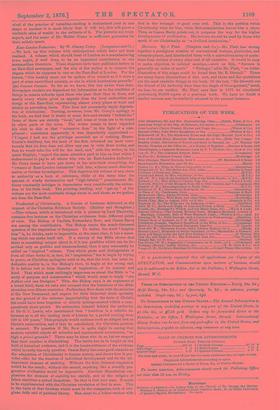East-London Industries. By W. Glenny Crory. (Longmans and Co.) —We
took up this volume with anticipations which have not been realised. A volume which should treat of London as a manufacturing town ought, if well done, to be an important contribution to our metropolitan literature. These chapters have been published before in an East-End newspaper, and the aim of the author is to remove the stigma which he supposes to rest on the East-End of London. For the future, "this locality must not be spoken of or treated as if it were a part of some uncivilised country, or one in which heathenism prevails." Qui s'excuse s'accuse. So far as we know, this has never been done. Newspaper readers are dependent for information as to the condition of things in remote suburbs upon those who pass their time in them, and nearly every winter gives us appeals from the local authorities and clergy of the East-End, representing almost every phase of want and misery as prevailing there. This does not necessarily imply degrada- tion or heathenism. Turning, however, from Mr. Crory's apology to his book, we find that it treats of some five-and-twenty " industries." Some of them are strictly "local," and some of them are to be found in other parts of the town. The writer seems to have regarded his visit to this or that "extensive firm" in the light of a com- pliment ; sometimes apparently it was imperfectly appreciated :— " I regret I had not the privilege accorded me of noticing Messrs. Currie's distillery, but the head of the firm informed me most cour- teously that his firm does not allow any one to visit their works, and that be would take the will for the deed, and," adds the writer, in his queer English, "regard the same attention paid to him as that which I endeavoured to pay to all others who own an East-London Industry." Mr. Crory seems to have put down in his note-book everything the "owners of East-London industries" told him, without much discrimi- nation or further investigation. This deprives his volume of any claim to authority as a book of reference, while at the same time the amount of windy declamation and " high-falutin'" preachments Mr. Crory constantly indulges in depreciates very considerably the attrac- tion of his little book. The printing, binding, and " get-up " of the volume are the most creditable things about it, and these, as we gather, are from the East-End.


































 Previous page
Previous page